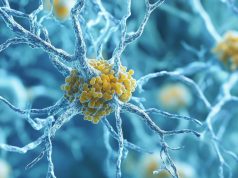Improved functional, survival outcomes seen with risdiplam treatment before development of clinical signs or symptoms
By Elana Gotkine HealthDay Reporter
TUESDAY, Aug. 19, 2025 (HealthDay News) — Infants up to 6 weeks of age with genetically diagnosed spinal muscular atrophy (SMA) who are treated with risdiplam before development of clinical signs or symptoms have better functional and survival outcomes at 12 and 24 months, according to a study published online Aug. 13 in the New England Journal of Medicine.
Richard S. Finkel, M.D., from St. Jude Children’s Research Hospital in Memphis, Tennessee, and colleagues conducted an open-label study of daily oral risdiplam in infants aged 1 to 42 days with genetically diagnosed SMA and without strongly suggestive clinical signs or symptoms.
Twenty-six infants with two, three, or four or more copies of SMN2 were enrolled. The researchers found that 21 infants (81 percent) could sit unsupported for 30 seconds after 12 months of treatment, and 14 and 11 (54 and 42 percent) could stand alone and could walk alone, respectively. Overall, four of five infants with two SMN2 copies and a baseline ulnar compound muscle action potential amplitude of at least 1.5 mV were able to sit without support for at least five seconds. After the month 12 visit, three infants were withdrawn from the study by a parent or caregiver. All 23 infants who completed 24 months of treatment were alive without use of permanent ventilation or feeding support. Nine treatment-related adverse events were reported in seven infants during a 24-month period; however, none were serious.
“For families facing a diagnosis of SMA, the results of this study offer real hope. Treating children before symptoms appear — when they are still developing normally — can change the entire trajectory of the disease,” coauthor Aledie Navas, M.D., from Nemours Children’s Hospital in Orlando, Florida, said in a statement. “We are no longer just managing symptoms; we are preserving strength, function and quality of life from the very start.”
Several authors disclosed ties to pharmaceutical companies, including F. Hoffmann-La Roche, which manufactures risdiplam and funded the study.
Editorial (subscription or payment may be required)
Copyright © 2025 HealthDay. All rights reserved.








